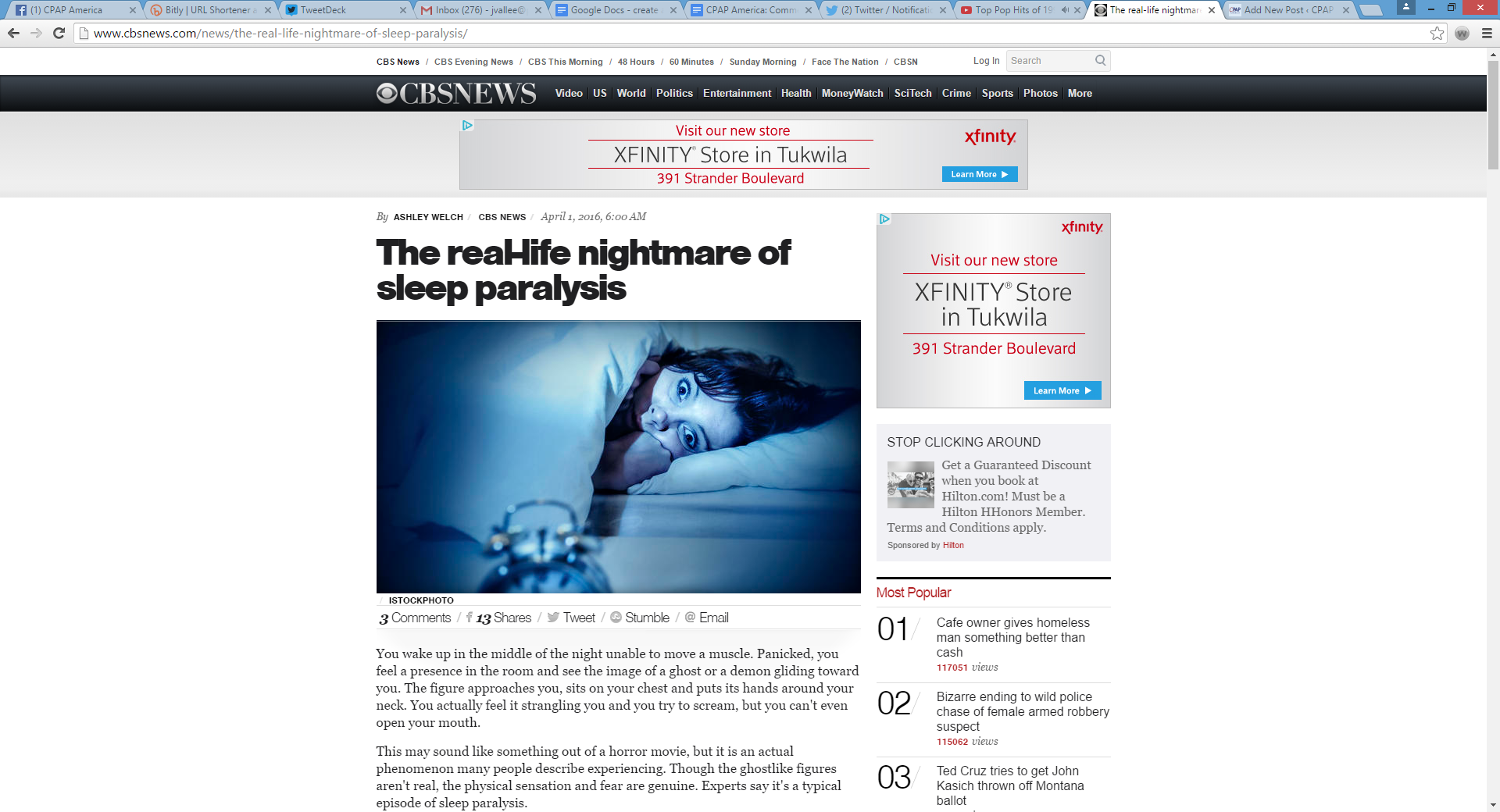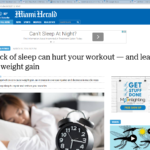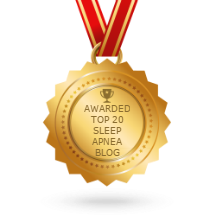Category Archives: Blogs

What exactly happens to your brain on no sleep?
Bedtime is one of the most important parts of the day for the brain. The latest studies show that when we slumber, the brain performs important housekeeping tasks that clear away the debris of the day’s work and help reset and restore nerve networks so they are ready to operate again at full capacity when we wake.
But a lack of sleep deprives the brain of this essential rest period, and our ability to get through the day might be compromised. In a small study published in the journal Radiology, a team of Chinese and European researchers report a more detailed analysis of how insomnia can affect specific types of brain nerves in parts of the brain that regulate cognition, emotion and sensory processes.

Which New Parent Will Sleep Less? Results may surprise
If you haven’t experienced it, no simple description will capture the feeling of deep, dizzying fatigue that can accompany the first few weeks with a newborn.
By the third child, Emily was wishing for an infant boarding school that could keep her son for those first few weeks of constant night waking and return him in a semiregulated state at about eight weeks. Well, not really, but the thought might have crossed her admittedly addled brain at 3 a.m. on several successive nights.
You might think that mothers, being the ones with the breast milk, have it the worst. But science seems to indicate otherwise.

Do you suffer from Sleep Paralysis?
Does Sleep Paralysis Exist? Apparently So
You wake up in the middle of the night unable to move a muscle. Panicked, you feel a presence in the room and see the image of a ghost or a demon gliding toward you. The figure approaches you, sits on your chest and puts its hands around your neck. You actually feel it strangling you and you try to scream, but you can’t even open your mouth.
This may sound like something out of a horror movie, but it is an actual phenomenon many people describe experiencing. Though the ghostlike figures aren’t real, the physical sensation and fear are genuine. Experts say it’s a typical episode of sleep paralysis.

A sleep scientist doesn’t recommend sleeping pills
Sleeping pills? Not so fast
For millions of Americans, one of the biggest obstacles of the day (or in this case, the night) is getting a good sleep.
Many are tempted by the quick-fix of taking sedatives or hypnotic medications — fancy words for sleeping pills. If you do this often, you’re not alone. The Centers for Disease Control and Prevention estimated in 2013 that about 4% of US adults older than 20 used a prescription sleep aid in the past month of their study.
But unless you have a diagnosible sleep disorder such as insomnia — which actually isn’t as common as many think — sleeping pills are a bad way to go, according to sleep scientist Patrick Fuller, a neurologist at Harvard Medical School.

Do NOT Do These 7 Things Before Sleep
Getting a good night’s rest is about more than just going to bed at an appropriate time.
It’s also about arranging your evening so that it’s not stressful or stimulating in a way that can make it hard to fall and stay asleep.
We know: It’s easier said than done.
To help you out, we’ve rounded up seven common behaviors that can ruin your rest — plus what you can do instead.

Sleep Apnea Can Promote Cancer Growth?
Study Shows New Linkage Between Sleep Apnea and Cancer Growth
When we think of the trouble that snoring and sleep apnea bring, the first is always the annoying noise. Then there’s the daytime sleepiness, and association with high blood pressure and heart diseases.
But promoting cancer growth?

Superman Sleeps? Yes He Does!
Yes, Superman needs sleep!
This week’s release of “Batman v Superman” will answer a number of longstanding questions. Is Ben Affleck fit to wear the iconic cowl? Will Wonder Woman make more than a cameo appearance? Has Zack Snyder truly learned nothing from the backlash to General Zod’s gruesome demise? These are all pressing issues, but we’re hoping the blockbuster might address another, longer standing one, too: Does Superman sleep?

Want To Sleep Better? Stop Worrying About It!
On average, you sleep 7 hours and 50 minutes per night. Considering that life expectancy for countries in the Western world is about 80 years — you’ll spend 26.6 years of your life asleep.
That’s almost 1/3 of your time on this planet. And yet, we feel tired so often. Just look at the person sitting next to you at the office, on the couch, or at Starbucks.
It’s also not a wonder we’re tired. We fill our lives with activities, work, and pleasure. Things that make us feel alive.
However, we need energy to make it through our days without being grumpy or not feeling down. Yes, caffeine will help you energize when you’re tired, but the energy boost doesn’t last long.
Our largest source of energy comes from sleep — we depend on it. That’s why we’re obsessed with “sleep hacks” and listicles that promise us to sleep like a third grader that has nothing to worry about. Who doesn’t want that?

How sleep deprivation can effect your workout
Lack of sleep= poor workout?
Your fitness routine is in full swing two months into the year: You’re eating right and you’re exercising, but you’re not yet seeing the results you want from your workout.
What’s missing? It might be sleep.
So say an increasing number of studies that show sleep deprivation causing such negative outcomes as weight gain, an increase in overuse injuries, a decrease in muscle mass and a reduction in testosterone (which has a whole host of other negative effects, including low sex drive, depression and bone loss).
“You can have two people who are doing the exact same workout and eating the same good nutrition, but one is seeing huge progress and the other isn’t. A lot of the time, good sleep is the difference,” says Mansur Mendizabal, a personal trainer and kettlebell instructor in Washington.
“Sleep is the only time the body is fully recovering and rebuilding,” he says.
In other words, it’s not enough to take a day or two off from training and slouch on the couch and expect good results. It’s sleep — specifically deep sleep — that is the difference when it comes to such things as muscle recovery, mental acuity and reaction time, another important aspect of sports performance.
“It’s during the deep stages of sleep that all the tissues of the body repair,” says John Broussard, a sports medicine doctor in Washington. “But you have to get into all the stages of sleep in the proper sequence to get those restorative benefits.”
There are four parts of the sleep cycle: Stage 1 (near-awake), Stage 2 (onset of sleep), Stage 3 (deep and restorative sleep) and Stage 4 (deep REM or dream state), which occurs at about 90 minutes into each cycle.
To read the rest of this sleep related article, click here:
http://www.miamiherald.com/living/health-fitness/article66082812.html
You can buy CPAP Machines, tubing and all of your CPAP supplies at CPAP America, 707 Mantua Pike, West Deptford, NJ 08096. Feel free to contact us at 1-800-569-0167.
You can also reach us via email here.

What you need to know about getting better sleep
We sleep every day. We’ve been doing it all our lives. So, why wouldn’t we assume we know all there is to know about getting the best sleep?

